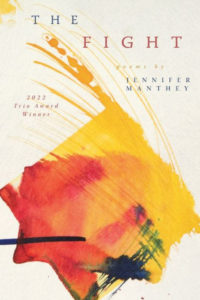 Review by Angela Williamson Emmert
Review by Angela Williamson Emmert
Minnesota poet Jennifer Manthey opens her award-winning, debut collection The Fight not with conflict but with an unexpected, though fraught, agreement.
“U.S. Embassy, Kinshasa, DRC” describes the process of an overseas adoption through a series of minor actions, each of them shaped by colonialism and determined by race. Black men hold doors while White men occupy offices; Black women “[speak]their answers” while White women “play the part […] dutiful and quiet.” Then with a startling, biting clarity the poem concludes: “At the end / of the afternoon we leave with their babies” (11).
The rest of the collection chronicles the life of one of these babies, from infancy to primary school. Throughout, Manthey scrutinizes the implications of this interracial adoption for both the child and the adoptive family. Often anecdotal and always precise, these poems record and confront the structural racism, micro-aggressions, and unexamined biases that go hand-in-hand with White privilege and White supremacy. This clear-eyed assessment of Whiteness demonstrates Manthey’s ability to use narrative as a poetic devise while revealing a pre-adoption naiveté that quickly gives way to awareness. The speaker’s subsequent self-recrimination makes this collection both an interesting and uncomfortable read. In “I Circle a City Lake and Converse with Nature Like a Real Poet,” for example, she confesses, “To the leafless tree, I sigh. You’re right, / I say, There are things my son needs // I can never give him” (25). In the poem “it wasn’t the orange I expected” Manthey is even more direct: “…something in me believing / I deserve to mother / another woman’s child” (38).
The most unsettling poems in this collection are written in the voice of Varina Davis, Jefferson Davis’s wife, who during the Civil War impulsively “rescued” and “adopted” a Black child known to history as Jim Limber. Eleven of the collection’s fifty-one poems are in Varina’s voice. They are incredible pieces, equal parts captivating and horrifying.
Manthey, though, is not the first poet to address this so-called adoption. In his collection In the Language of my Captors (Wesleyan University Press, 2017), Shane McCrae, who like Limber was raised under dubious circumstances by a White family, implements Limber’s voice to expose the power dynamics that come into play when White families adopt interracially. In “Jim Limber the Adopted Mulatto Son of Jefferson Davis was Another Child First,” for example, a young Limber describes the second-hand clothing he wore while living in the Davis’s home. Because the clothes first belonged to a deceased Davis son, Limber’s identity is erased as he is slotted into another role.
Manthey alludes to a similar erasure of identity in the poem “Lure,” where the speaker admits to the child, “Before / I took away your country, / I panicked.” She continues, “Someday you may find ancestry rushing, / blood-quick; // home might always be motion. // A place slipping / past your ankles” (18). The imagery of the river calls up Langston Hughes’s “The Negro Speaks of Rivers.” Like Hughes, this child has left behind, and may one day search out, not only a country, but a whole other self.
In “Thanksgiving, 2020,” the speaker reveals that she is in touch with the child’s birth mother through WhatsApp and that the mother’s only request was that her child attend church. Although the speaker has fulfilled this wish, she admits that her own faith, perhaps the very faith that inspired this adoption, has since waned. In the absence of faith, she is left with twin realizations regarding her son, equally devastating. “…I am not the dinner-bell,” she writes in “Self-Portrait as Adoptive Mother.” “I’m not the loudest clang of home” (76), and in fact, “…I could be / anyone at all” (75).
There is no doubt that the speaker in these poem loves this child. But her love is a White woman’s love. Manthey is remarkable not only for fearlessly and relentlessly exploring this love, but for her insistence that readers, especially White readers, do the same.
The Fight by Jennifer Manthey
Trio House Press, Inc., 2023, $18.00
9781949487138
Angela Williamson Emmert’s work has appeared in About Place Journal, Prime Number Magazine, Sky Island Journal, and other places. She holds an MFA from University of Southern Maine and lives in rural Wisconsin with her husband and sons.
